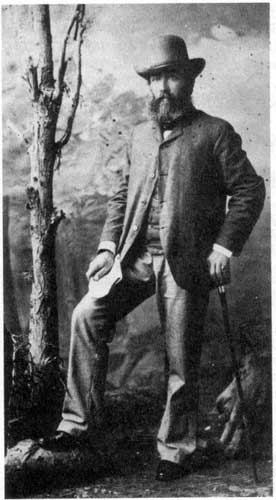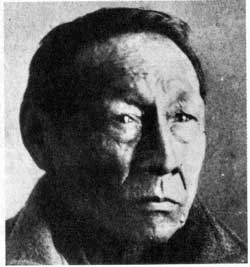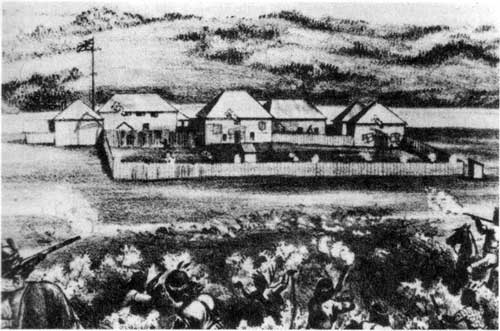by W. J. McLean
Manitoba Pageant, Winter 1972, Volume 17, Number 3
|
The following extracts are from the diary of W. J. McLean, Chief Factor, Hudson's Bay Company, who was transferred from Ile a la Crosse to Fort Pitt in the autumn of 1884. When McLean arrived at Fort Pitt on October 28, he found the Indians "restless and turbulent," but after several chats with Big Bear, the Plain Cree Chief, McLean was able to "settle them down for the winter in a spirit of better will and contentment." In the spring, however, all hell broke loose ...
This narrative is published by permission of D. J. McLean, 390 River Avenue, Winnipeg, a son of W. J. McLean.
On April 19 we reached camp at Frog Lake, where we found James K. Simpson and his family, also Mrs. Delaney and Mrs. Gowanlock. These two unfortunate women were in the keeping of John Pritchard and his family, and he, being reared as a French half-breed, was not harmed by Big Bear's warriors. He extended his sympathy to the two helpless widows, whose husbands had been shot by their side.
On the 20th some of my party visited the scene of the tragic events of April 2nd and did the best we could to inter the bodies of the massacred people, which were lying exposed to the weather where they fell. The Indians had cast the bodies of the two slain priests into the cellar of the church and burned the edifice. We remained in the vicinity of Frog Lake for over two weeks. At this point Mr. James K. Simpson became my confidential interpreter, and was always camped near my tents with his family, as were a number of Indians and half-breeds who were compelled to join the rebellious camp by some of Big Bear's followers.

W. J. McLean, 1885

Chief Big Bear
Among them were three or four very intelligent and influential Indians from the Riding Mountains in the Swan River District. They were well known to me during the ten years I was stationed in the district, which at that time included Fort Qu'Appelle. I sounded them out as to their sentiment and found that they were loyal. After a few days one of them informed me as to what was being discussed in council. This was done through Mr. Simpson so as to avoid detection of my having any dealings with them or they with me.
Late that night, after I had posted Mr. Simpson on what I wished them and their friends to advocate at the following day's council, we both re-paired to a special lodge where our friends would meet us. We had to do !his with great caution and incognito; wrapped with a robe or blanket we went unnoticed to our council tent, and there without fire or light we discussed matters for the following day's council.
We carried on our meetings night after night, increasing the number of our adherents until at last we had a ruling majority at the councils. This caused bitter feelings between the Plain Indians who were followers of Big Bear and the Wood Crees, many of whom were very much against taking part in the rebellion. My friends from Riding Mountain had a letter from Andre Nault addressed to Alexander Hamilin of Lac la Biche urging him and all the half-breeds and Indians of that place to come at once and join Big Bear and then proceed to Batoche and join Riel.
That letter contained many statements that were far from true. It set forth in glowing terms that Louis Riel had fought and won a great battle against the Mounted Police at Duck Lake and that Big Bear's followers had great victories at Frog Lake and Fort Pitt. Hamilin, being a man of good common sense, was not influenced, however, by such exaggerations, and instead of sending them any encouragement, he sent back a message saying that no half-breeds from there would go and join such a murderous rang as Big Bear had as his followers. If they sent any more couriers to him, he, with two hundred men, would receive them with rifles and the same kind of bullets as Big Bear used to kill the innocent priests at Frog Lake. This message was received about 4th of May; and while it was received by the followers of Big Bear with great disappointment and some dismay. the majority of the Wood Crees were secretly pleased and so was I.

Big Bear's band attacking Fort Pitt, 1885.
At this time a despatch came to Chief Big Bear from Chief Pound-maker who was concentrated with his followers near Battleford. It asked Big Bear and his followers to join him without delay. He said on being -notified of Big Bear's starting out, he would send one hundred carts and horses to meet them at the crossing of the Saskatchewan River near Fort Pitt. He would give Big Bear's people a good reception and for this purpose was holding sixty fat cattle for them. After they had joined together they would take Battleford with its large stock of provisions and then go on to join Riel at Batoche.
This important missive was first read by Andre Nault of Big Bear's band. The Wood Crees, however, were not satisfied that Nault's reading as wholly truthful and asked that the letter be read by me. I read it sentence by sentence to the end and it was translated and explained to than without interruption. After all had signified their satisfaction that they were informed correctly according to the letter, "Wandering Spirit" came forward to where I was sitting and putting his hand on my shoulder, remarked, "We can find no fault with him." I did not at this time know what induced this remark, but was afterwards told that Nault and Louis Montour who were suspicious of my influence over the Wood Crees were urging the Plain Crees to kill me.
After that the Wood Crees placed a sentry on my tents every night, fearing for my safety right up until the time we got clear of Big Bear at Loon Lake on or about the 6th of June.
That evening one of Big Bear's headmen went calling through the camp that they must make ready as soon as possible to join Poundmaker. The prospect of them joining Poundmaker I regarded as a very serious affair, as I knew well that the more rebellious Indians got together the more mischievous they would become; besides, their strength would be so much greater if they should engage in a fight with the Mounted Police. It was therefore most important to prevent their juncture with Poundmaker and a subsequent union with Riel and his forces.
With this in mind I got Mr. James Simpson to see my loyal Indian friends from Riding Mountain and ask them to bring together as many as they could of the Wood Indians to hold a secret meeting that night in one of their tents and we would join them. At the stated time we met and found all the leading men of the Wood Crees were there to meet us. I at once made known that I was opposed to them joining Poundmaker and Riel and quoted substantial and convincing reasons for their not doing so. I pointed out that there was no reason they should be led by the Plain Crees and belittle themselves as they were three to one of them and should not be dictated to by them at any time. It was at once apparent that I had touched their dignity which greatly strengthened my object.
I then instructed them what to say next morning at the General Council; to stress the wisdom of not putting themselves in the way of trouble and to point out to Big Bear's Indians the position they were in with respect to a long march. Their horses were too poor to travel far, and they had not sufficient means to convey their women and children nor their stocks of provisions which they must not abandon. It would be well, I pointed out, to send messengers of their own to find out how Poundmaker was situated, meanwhile getting their horses into condition again.
They coincided with my views and introduced them at the next morning's council meeting, as if all had originated among themselves. The meeting was by no means harmonious. Montour and Nault had been inciting the Plain Indians to action very different from that I was advising the Wood Indians to do. Consequently, nothing was agreed to that day. In the evening one of Big Bear's headmen came to my tent and asked what I thought of their sending a messenger to Poundmaker, and of course I told him with seeming ignorance, that in view of what had been discussed in council that it would be wiser to do that than make an effort right away to join him. Poundmaker might be in trouble before they could reach him, I indicated, as they would have to travel slowly and occupy much time crossing the river (Saskatchewan).
That night I told the Wood Crees that one of Big Bear's headmen had asked advice from me and told them what I had suggested. I urged them not to deviate from the stand they had taken that morning and felt sure that they would in that case show their superiority of judgement over the Plain Crees and score a point. Next morning council was convened as usual and it was agreed to send couriers to Poundmaker and await their return.
At this time the Chipewyans of Cold Lake and Beaver River Mission, some fifteen families, with their pastor, Reverend Father Legoff, were reluctantly brought into camp from the Beaver River Mission. On their arrival, the Reverend Father asked to see me. I went at once to meet him, having been told he was in great fear. When he saw me he ran towards me and exclaimed, "Oh, Mr. McLean, save my life!" The poor father was broken down with grief and fear that he was to suffer the same fate as his colleagues of the Frog Lake Mission. I told him I felt sure no harm would befall him. I took him to my tent and after he had a little refreshment and conversation, I escorted him back to his people.
The following Sunday he held divine service in the camp, and a large congregation listened attentively. He spoke in the different Indian languages and also in French. The Reverend gentleman prayed most devoutedly for good fellowship and Christian love among all men and nations. Strange to say, in the circumstances, a small contribution of money was collected and tendered to the Father at the end of the service, to which the followers of Big Bear contributed the most, some of which they had probably taken sacrilegiously from the bodies of his brethren slain at Frog Lake Mission.
Only for one pitiable case of sickness which was fraught with savage superstitution and ended in murder, things were comparatively quiet in camp for a few days. An unfortunate woman who was suffering from some severe sickness became delirious and then according to Indian superstition she became a cannibal, and in accordance with their custom must be killed. It was not, however, an ordinary man that could do that. It required a man possessed with the power to overcome the evil spirit that overpowered the cannibal. I was warned to keep my children inside my tent as the unfortunate one was bent on eating human flesh before the sun went down. The Indians thought she would likely try for one of our children as she was close to our tent. I evinced no alarm and said I would go and see her. I went to her tent. Two brothers were in charge of the poor creature who was posed in a half sitting position with her hands and feet bound with wire. One of the brothers was very anxious that I should kill her. I spoke to her through my interpreter, and much to my surprise she told him to tell me that she was bound to eat a white man's flesh before the sun went down.
At this barbarous announcement my pity turned to disgust and I left her. By this time the whole camp was very much excited over the cannibal and they concluded that she must be killed immediately. The trouble was to find someone among themselves who would do the job. The leading men of her own tribe were then sent to me with the request that I kill her. They offered me a huge double-edged dirk to do it with. As I did not regard things in the same way, they had faith in my being able to overpower the evil spirit.
I explained to them that while I was not afraid of any evil spirit, I could not kill her, and I indicated that I was sure their unfortunate kinswoman would not live long in any event. They then asked a Chipewyan Indian to do the deed, but he declined, pleading that he like themselves was not able to do it. They then walked away to where their people were and engaged in an excited discussion over the execution of the (to them) dreadful cannibal. I was seized by the loathsome horror that I might be compelled to take the life of that miserable and helpless woman, and not until I was informed that an old heathen half-breed (known as Choilebois) had consented to kill her, was my mind relieved from the fear of being a compulsory murderer.
I was keeping out of sight in my tent when suddenly Chief Big Bear knocked at the entrance and by a reluctantly given invitation he entered and told me to make ready to join them. The cannibal was to be killed at once, and I would have to accompany them to the place of execution. In a few minutes forty or fifty of the older Indians passed in front of my tent carrying the self-declared cannibal on a stretcher made of rawhide. I was ordered to join the procession and take my place beside Big Bear.
All had their rifles and some were carrying axes as well. Choilebois was got up in all sorts of pigments and looked savagely hideous. He was armed with a huge wooden club with which he was to carry out his diabolical task. We travelled about a quarter of a mile from the camp and then halted. The victim was let down to the ground and put in a sitting position with her head bent forward. Choilebois stood behind her. I was asked to stand close by, and was given an axe. I was ordered to strike her down with this should she jump up after being struck by Choilebois, otherwise the evil spirit in her would devour some of them.
I held the axe in readiness but felt perfectly sure that I would not have to use it. The Indians placed themselves in a large circle, standing about twelve feet off. Choilebois then raised his deadly bludgeon and with a fiendish yell came down with it on the head of that silent, helpless wretch. You will readily believe that my services were not required, nevertheless the Indians rushed forward and fired several shots into the lifeless body. The scene was indescribably horrid. I stepped forward and shouted: "That will do!" Then I covered her with the fold of a blanket. After I left the hateful scene the savages cut off her head and burned it apart from her body, which they also burned.
The next day the camp was shifted a short distance to the south where there was better feeding for the horses. A day or two was spent in quietness there, excepting the roll of the war drums and the dance which they kept going most of the day and all night, with an occasional volley of rifle fire, which kept us in a continuous state of nervousness and fear ...
Page revised: 20 July 2009